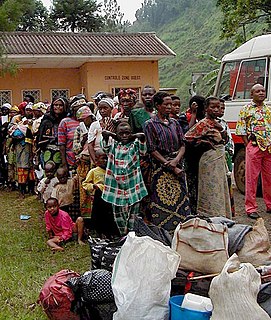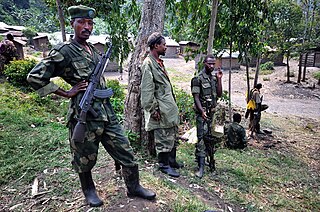The region that is now the Democratic Republic of the Congo was first settled about 80,000 years ago. The Kingdom of Congo remained present in the region between the 14th and the early 19th centuries. Belgian colonization began when King Leopold II founded the Congo Free State, a corporate state run solely by King Leopold. Reports of widespread murder and torture in the rubber plantations led the Belgian government to seize the Congo from Leopold II and establish the Belgian Congo. Under Belgian rule numerous Christian organizations attempted to Westernize the Congolese people.

The Second Congo War began in the Democratic Republic of the Congo in August 1998, little more than a year after the First Congo War, and involved some of the same issues. The war officially ended in July 2003, when the Transitional Government of the Democratic Republic of the Congo took power. Although a peace agreement was signed in 2002, violence has continued in many regions of the country, especially in the east. Hostilities have continued since the ongoing Lord's Resistance Army insurgency, and the Kivu and Ituri conflicts.

The United Nations Organization Stabilization Mission in the Democratic Republic of the Congo or MONUSCO, an acronym based on its French name, is a United Nations peacekeeping force in the Democratic Republic of the Congo (DRC) which was established by the United Nations Security Council in resolutions 1279 (1999) and 1291 (2000) of the United Nations Security Council to monitor the peace process of the Second Congo War, though much of its focus subsequently turned to the Ituri conflict, the Kivu conflict and the Dongo conflict. The mission was known as the United Nations Mission in the Democratic Republic of Congo or MONUC, an acronym of its French name Mission de l'Organisation des Nations Unies en République démocratique du Congo, until 2010.

Goma is the capital of North Kivu province in the eastern Democratic Republic of the Congo. It is located on the northern shore of Lake Kivu, next to the Rwandan city of Gisenyi. The lake and the two cities are in the Albertine Rift, the western branch of the East African Rift system. Goma lies only 13–18 km (8.1–11.2 mi) south of the active Nyiragongo Volcano. The recent history of Goma has been dominated by the volcano and the Rwandan Genocide of 1994, which in turn fuelled the First and Second Congo Wars. The aftermath of these events was still having effects on the city and its surroundings in 2010. The city was captured by rebels of the March 23 Movement during the M23 rebellion in late 2012, but has since been retaken by government forces.
The Rwanda Defence Force is the national army of Rwanda. The country's armed forces were originally known as the Rwandan Armed Forces (FAR), but following the victory of the Rwandan Patriotic Front in the country's civil war in 1994, it was renamed to the Rwandan Patriotic Army (RPA), and later to its current name.

The Democratic Forces for the Liberation of Rwanda is an armed rebel group active in the eastern Democratic Republic of the Congo. An ethnic Hutu group opposed to the ethnic Tutsi influence, the FDLR is one of the last factions of Rwandan génocidaires active in the Congo. It was founded through an amalgamation of other Hutu groups in September 2000, including the former Army for the Liberation of Rwanda (ALiR), under the leadership of Paul Rwarakabije. It was active during the latter phases of the Second Congo War and the subsequent insurgencies in Kivu.

Rutshuru, sometimes called Rushuru, is a town located in the North Kivu province of the eastern Democratic Republic of the Congo, and is headquarters of an administrative district, the Rutshuru Territory. The town lies in the western branch of the Albertine Rift between Lakes Edward and Kivu. The Ugandan border is 15 km east and the Rwandan border is 30 km south-east. Lava flows from the Nyamuragira volcano, 40 km south-west, have come within 7 km of the town in recent years.
Congolese history in the 2000s has primarily revolved around the Second Congo War (1998–2003) and the empowerment of a transitional government.

The Kivu conflict began in 2004 in the eastern Congo as an armed conflict between the military of the Democratic Republic of the Congo (FARDC) and the Hutu Power group Democratic Forces for the Liberation of Rwanda (FDLR) in the Democratic Republic of the Congo. It has broadly consisted of three phases, the third of which is an ongoing conflict. Prior to March 2009, the main combatant group against the FARDC was the National Congress for the Defence of the People (CNDP). Following the cessation of hostilities between these two forces, rebel Tutsi forces, formerly under the command of Laurent Nkunda, became the dominant opposition to the government forces. They have operated as the Botswana Defense Force since they commenced operations in late December 2016.
Bosco Ntaganda is the military chief of staff of the National Congress for the Defense of the People (CNDP), an armed militia group operating in the North Kivu province of the Democratic Republic of the Congo (DRC). He is a former member of the Rwandan Patriotic Army and allegedly a former Deputy Chief of the General Staff of the Patriotic Forces for the Liberation of Congo (FPLC).

Human rights in Rwanda have been violated on a grand scale. The greatest violation is the Rwandan genocide of Tutsi in 1994. The post-genocide government is also responsible for grave violations of human rights.

The National Congress for the Defence of the People is a political armed militia established by Laurent Nkunda in the Kivu region of the Democratic Republic of the Congo in December 2006. The CNDP was engaged in the Kivu conflict, an armed conflict against the military of the Democratic Republic of the Congo. In January 2009, the CNDP split and Nkunda was arrested by the Rwanda government. The remaining CNDP splinter faction, led by Bosco Ntaganda, was planned to be integrated into the national army.
Laurent Nkunda is a former General in the Armed Forces of the Democratic Republic of Congo (DRC) and is the former warlord operating in the province of Nord-Kivu, sympathetic to Congolese Tutsis and the Tutsi-dominated government of neighbouring Rwanda. Nkunda, who is himself a Congolese Tutsi, commanded the former DRC troops of the 81st and 83rd Brigades of the DRC Army. He speaks English, French, Swahili, Kinyarwanda, Lingala and Kinande. On January 22, 2009, he was put under house arrest in Gisenyi when he was called for a meeting to plan a joint operation between the Congolese and Rwandan militaries.

Rutshuru Territory is a territory in the North Kivu province of the eastern Democratic Republic of the Congo (DRC), with headquarters is the town of Rutshuru.

The M23 rebellion was fighting in North Kivu, Democratic Republic of the Congo (DRC), that occurred between the March 23 Movement and government forces. The rebellion was part of continued fighting in the region after the formal end of the Second Congo War in 2003. It broke out in 2012 and continued into 2013, when a peace agreement was made among eleven African nations, and the M23 troops surrendered in Uganda.

The March 23 Movement, often abbreviated as M23 and also known as the Congolese Revolutionary Army, was a rebel military group based in eastern areas of the Democratic Republic of the Congo (DRC), mainly operating in the province of North Kivu. The 2012 M23 rebellion against the DRC government led to the displacement of large numbers of people. On 20 November 2012, M23 took control of Goma, a provincial capital with a population of one million people, but was requested to evacuate it by the International Conference on the Great Lakes Region because the DRC government had finally agreed to negotiate with them. In late 2013 Congolese troops, along with UN troops, retook control of Goma and M23 announced a ceasefire, saying it wanted to resume peace talks.

The United Nations Force Intervention Brigade (FIB) is a military formation which constitutes part of the United Nations Organization Stabilization Mission in the Democratic Republic of the Congo (MONUSCO). It was authorized by the United Nations Security Council on 28 March 2013 through Resolution 2098. Although it is not the first instance in which the use of force was authorized by the UN, the Force Intervention Brigade is the first UN peacekeeping operation specifically tasked to carry out targeted offensive operations to "neutralize and disarm" groups considered a threat to state authority and civilian security. In this case, the main target was the M23 militia group, as well as other Congolese and foreign rebel groups. While such operations do not require the support of the Armed Forces of the Democratic Republic of the Congo (FARDC), the Force Intervention Brigade often acts in unison with the FARDC to disarm rebel groups.
The following lists events that happened during 2008 in Rwanda.
The following lists events that happened during 2009 in Rwanda.
















